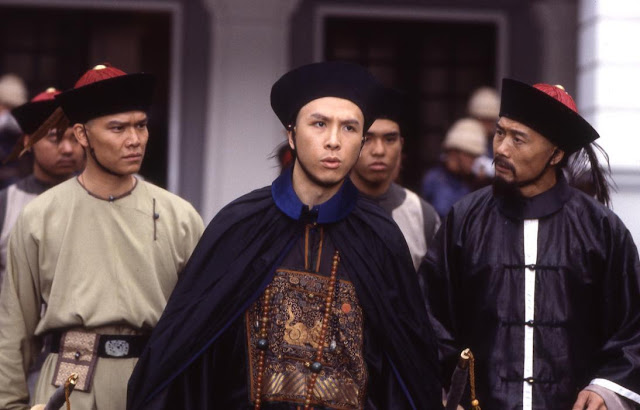 |
| 'Along the River During the Qingming Festival' |
Braving traps and ambush in the old mine, our heroes save the Sword Sister from prison
Confronting General Yen at Qingming, our heroes take their revenge in blood
The next morning our heroes (see PC profiles here) awoke to find Yang and Liu already up, and working to help the Two Elders cook breakfast. After the meal, Feng, the Old Man of Lushan, declared that he would teach Yang and Liu his kung fu - having observed their contest with the other banes the day before, he had concluded that our heroes lack the aptitude to master another one of the Trigram kung fu styles. Our heroes parted ways with Yang and Liu, and made plans to rendezvous with them in three months.
On their way back to Tongling, our heroes came to take a rest at a teahouse. Here they observe two men playing a game of weiqi in a nearby table. One was dressed in the clothes of a scholar, while the other one wore the clothes of a labourer. His curiosity piqued, Wu approached the table to observe the game, and found that they two were highly skilled players, but the labourer was losing the game. Presently the labourer began to accuse the scholar of cheating, and the scholar laughed the accusation off in good nature. The labourer turned to Wu and asked his opinion, to which Wu replied: the wise player knows when to quit. The labourer then conceded the game, and grab the cup of wine offered by the scholar. As he did so some of the wine spilled out of the cup, and where the spilled wine landed on the table it began to burn through the wood. Unfazed, the labourer downed the wine in a single gulp, but suffered no ill effect.
The scholar then introduced himself to our heroes: he was the Jade-faced Scholar, the chief of the Twelve Banes of Jiangnan. The labourer was his deputy The Brute, and they were having the usual bet: if The Brute lost the game, he would have to drink a poison concocted by the Scholar - the Scholar enjoyed creating new poisons, while The Brute enjoyed proving his ability to resist all poisons. The other Banes now entered the teahouse, and the Scholar bade all to sit around a large table. When all had been seated, he made a proposal to our heroes: with the Two Elders now in seclusion and the Two Emissaries dead, the Twelve Banes were now down to eight - would our heroes join them and bring the number up to Twelve again? While they had been working for General Yen, the Scholar had decided now to align himself with the Ming rebels, and hope that the heroes' relationship with Prince Gui would allow them a chance to gain positions of power in the new government when the rebellion wins. Our heroes were reluctant to join the criminals, but found it hard to refuse them, until Wu asked to be allowed to defer the decision to after they had taken their revenge on General Yen. Satisfied with that reply, the Banes left,
When they arrived back to Tongling, our heroes learned that the leader of the Sword Sisters had been arrested by the Qing. General Zhuo, who had been appointed by General Yen to replace General Yu, had closed the city gates and threatened to execute one woman from every household in the city if the Sword Sisters did not surrender themselves. Duan, the leader of the Sword Sisters, surrendered herself. The city gates were opened, and most of the womenfolk in the city fled to the countryside afterwards.
Our heroes resolved to rescue Duan. Through his contacts in the Beggar Sect, Wang learned that Duan was not kept at the city prison, but had been transported to a secret prison located in an abandoned copper mine outside the city. Taking the guises of the merchants who supplied food to the guards and prisoners at the secret prison, our heroes drugged the food, and when the guards had fallen asleep from the effect of the drug, entered the old mine.
Inside, they followed torches set at intervals along the walls of the mine shaft inwards. They found that the deeper chambers of the mine had been turned into prison cells, and that several prisoners were being held there, all fast asleep from the drug in the food. In the innermost cell was Duan, trapped beneath an iron cage.
Our heroes opened the cell doors with the keys they took from the drugged guards, but as Soong dragged one of the prisoners out he realised that the man was heavier than he expected for a prisoner. At the same time, Wang realised that prison lacked the stench of a normal one. Soong kicked the prisoner, who instantly woke up and readied himself to fight: it was a trap! A portcullis dropped over the cell where Duan was held, trapping Zhang inside, while at the same time the lights went out, and the prisoners exited their cells and started to attack Soong, Wang, and Wu.
But the darkness was not the only obstacle our heroes faced, as there were flame and spike traps in the corridors. After a hard fight, our heroes freed Duan, and together they fled the prison. For his heroism, Duan relieved Wu of his vow to disable his kung fu, and instead made him swear to not pass it on.
Months passed as our heroes laid low, until they once again reunited with Yang and Liu. Together, they studied and practised their kung fu, such that by the time spring came, they had learned the weakness of General Yen's kung fu.
And so when the Qingming Festival approached, our heroes were ready to exact their vengeance. The Sword Sisters had learned of the location of General Yen's parents' tomb, and our heroes resolved to ambush him there, when he was expected to be accompanied by few guards.
Sure enough, came the day when the General came to worship at his parents' tomb, he left the two dozen men in his retinue at the foot of the hill with his mount, taking only two bodyguards with him. Our heroes laid in ambush, and when he had completed the rites of worship, sprung their attack by throwing missiles at the general. General Yen dodged the attacks. Immediately one of the bodyguards drew a bamboo tube from his sleeve and tugged at a string at one end, sending a signal flare into the sky - the guards at the foot of the hill would arrive in under twenty minute.
Our heroes charged into combat. Yang and Liu drew the bodyguards away from Yen, while our heroes surrounded Yen. Beset on four sides, the general found it impossible to defend against the flurry of blows from our heroes. During a lull in the fighting, he tried to convince them to join him in service of the Qing court, but our heroes would not relent. The general fought on valiantly, but by the time the guards came into view they were only in time to see him fall. The six heroes disappeared into the woods surrounding the tomb, and were seen no more.
Prepping and Running the Game
So concluded our short wuxia campaign.
By the end of the last session I thought that we had gone through most of the tropes of the genre, with only the final boss fight to play. I had some trouble coming up with material to fill the session until then, but once again this blog came to my rescue.
I decided to place a dungeon into the session, and to plant some traps in it, utilising some of the dungeon trappings models FG and I had. The players of course knew they were walking into a trap when I put the map onto the table, but nevertheless the fight was quite fun.
The final boss fight was tactically less interesting, I made the (possibly wrong) decision of using the two party NPCs to tie up Yen's bodyguards, essentially reducing the fight to a four PCs vs one NPC fight. The fight was static, with Yen surrounded on four sides by the PCs. As luck would have it three of the PCs were ahead of Yen in the initiative order, with Soong, the PC with the highest damage output going after. Each round saw Yen fending off the attacks from the three PCs, retaliating and wounding perhaps two of them, before being struck and wounded by Soong. This was not tactically interesting, but as we were all into the trope, we saw it was the three PCs occupying Yen's attention and drawing his attacks to allow Soong to land his blows. This interpretation was made more real when Wang and Zhang took so much damage that they were worried about being knocked out of the fight, with Wang using his kung fu to block damage inflicted on Zhang, and Wang having to spend Qi points to gain temporary hit points to stay in the fight. Now per the stats in the rules Yen would have been able to outlast the PCs, but I decided to reduce his hit points so the fight would not drag out, and have him fall at a dramatic moment.
All in all I would say this was a fun campaign that allowed us to indulge in the tropes of the genre. The combat rules were sufficiently crunchy to give each PC a different combat style, although it did also mean that the GM had to spend some time designing the NPC opposition to make the combats interesting.
While the genre was a fun to play, it is not one that I see us playing for long term or repeatedly. I am interested however in playing a gun-fu version of the rules, maybe a short campaign set in the John Wick universe, where the villain will also be played by Donnie Yen.
We will take a break from our usual campaigns this month and next as I have some work commitments and some of the players will be traveling. Instead we plan to play a series of one-shots, with Dave (and hopefully Dzaki) each taking a session, while I am aiming to run three sessions open to members on our Meetup group.
Addendum: I found out that DwD Studios actually has a set of Espionage/Paramilitary RPG rules called Covert Ops based on the same engine. Looks like it is on...





